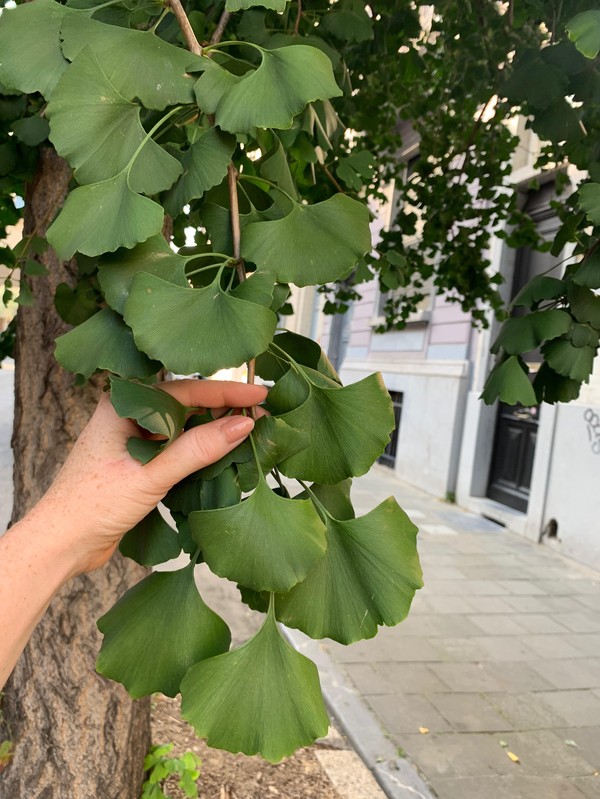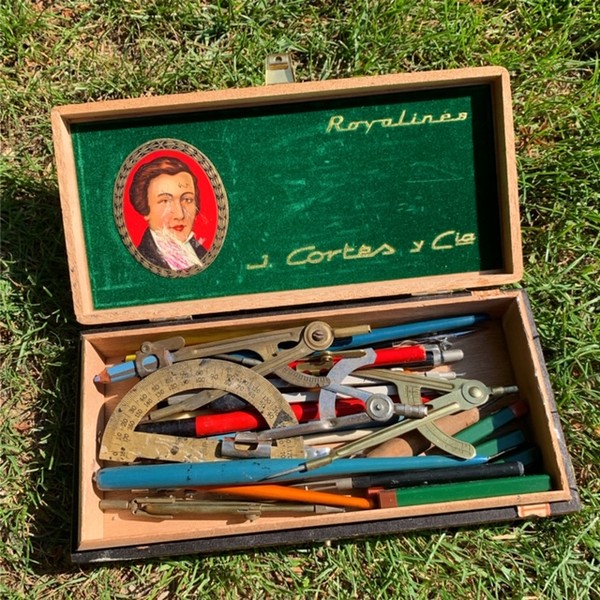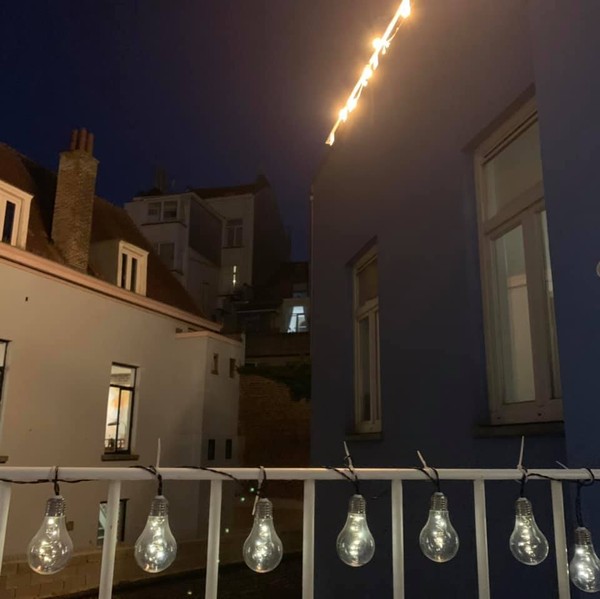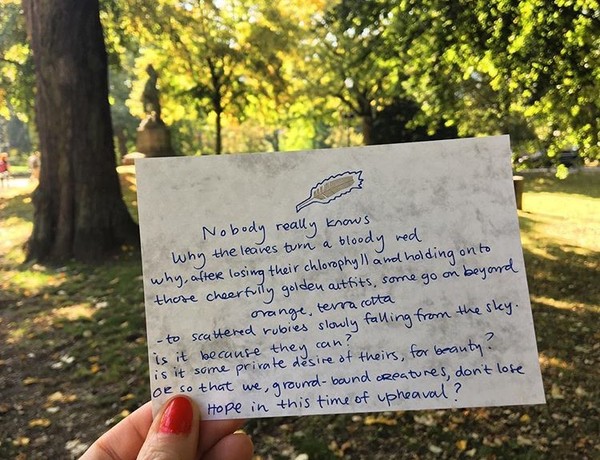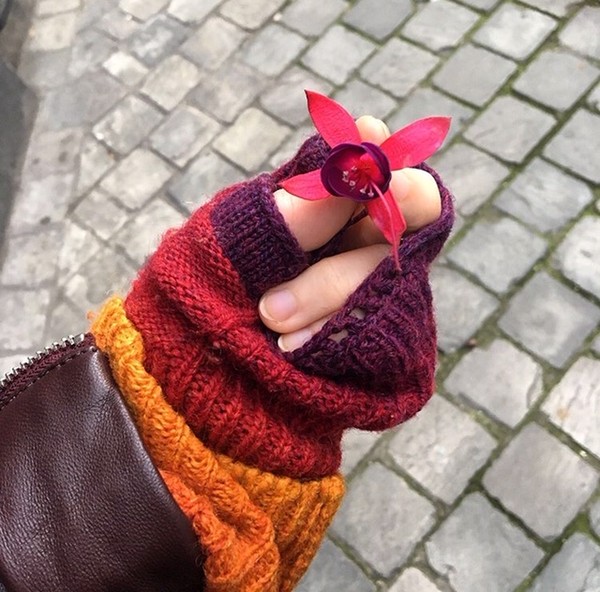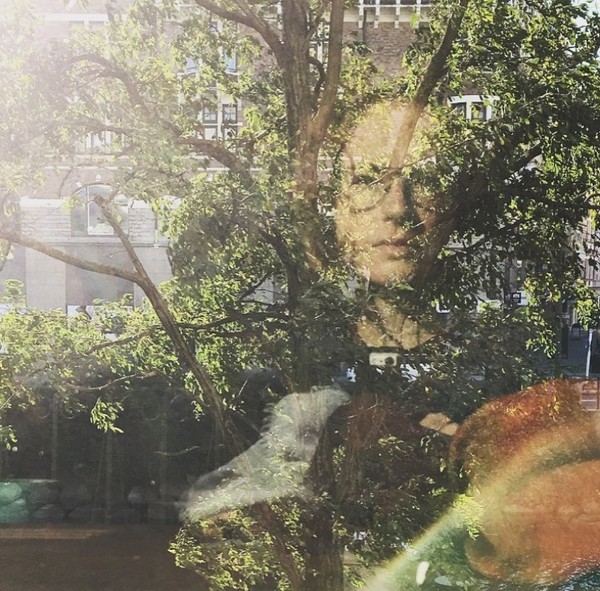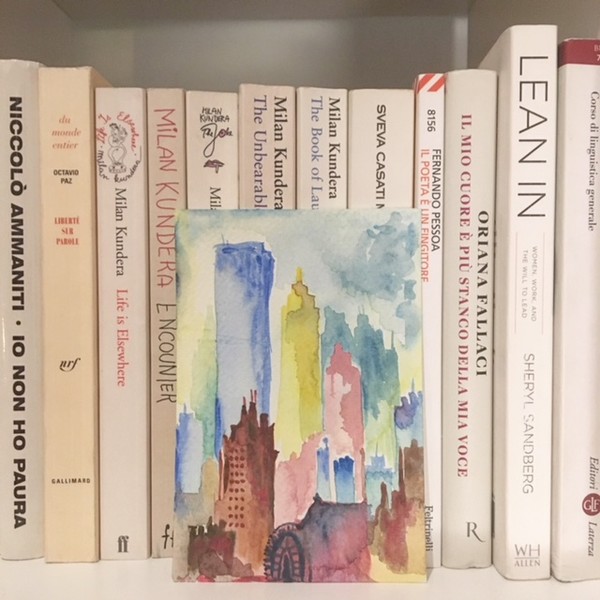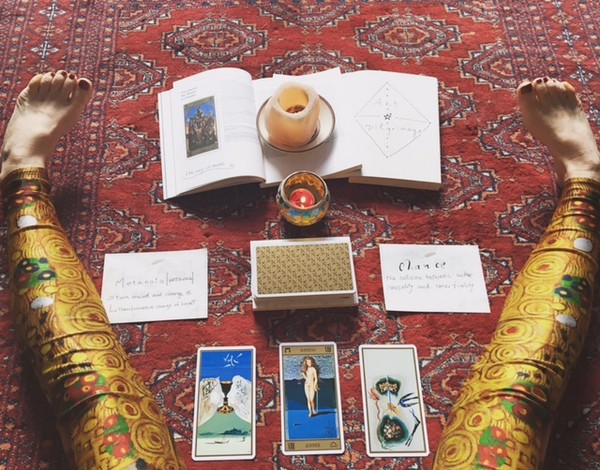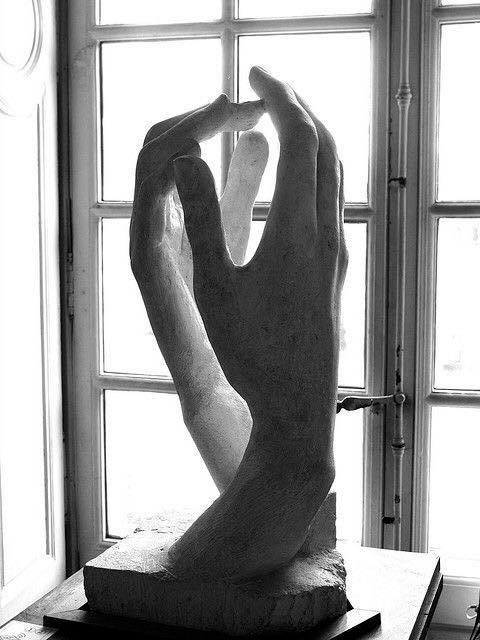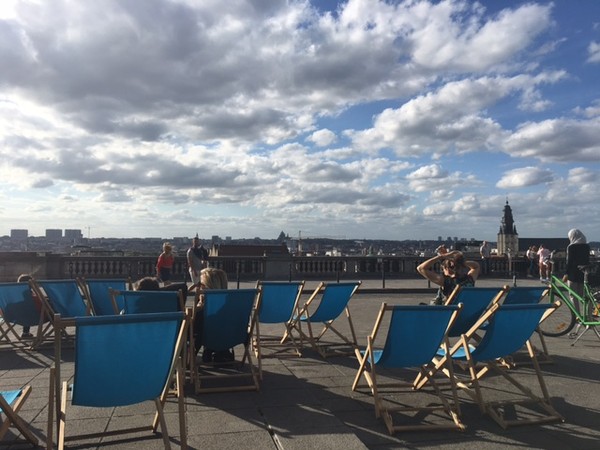Being Delighted: a living fossil
The ginkgo tree has basically looked the same for 270 million years. Take a moment to think about that. That's before mammals even existed, which makes it a living fossil. There's a street in Brussels lined by ginkgos. It happens to be the street where the Belgian architectur Victor Horta's former house is located. It's facade is majestic and characteristically art nouveau. I passed by yesterday, as I have many times, and I thought it's obvious that such a beautiful building should be surrounded by the noblest of trees, reminding us of our place as newborns in the long arch of history. Serendipitiously, ginkgo is a common motif in 20th century art noveau.
My love affair with the ginkgo did not start with its history. Instead it was an infatuation with the leaves themselves; their shape such an unlikely one, as if they were made more for the arts than for nature. Tiny green fans refreshing the trunk and branches, shaking densely in the breeze like bright green pom-poms. And in the fall they turn a saffron yellow so intense you're could be forgiven for forgetting they used to be green.
I spent a few days in Washington D.C for a course last year. Every morning I'd walk from one side of Dupont Circle to another, and I stumbled upon this lovely DC street where the ginkgos had just started to shed their leaves. Every morning I would pick up a few yellow ones and slide them into a book, or two, that I was carrying. As I flew back across the Atlantic after a month in the US, those saffron leaves, neatly tucked in between pages of text, came with me. Every now and then, I slip one of the dried fan-shaped talismans into a book I will one day open and be delighted all over again.
Being Delighted: the art of the deal
Maybe it's the way it seems to go so counter to the society in which we exist, where everything is available to us, and so readily custom made. Maybe that's why nothing appears more precious to me than a really unexpected, quirky or random find at a flea market. There's also the complex essence of the discovery; it's not really an achievement, these treasures are purely luck, coincidences or the universe's winking at you, and yet you feel like you've earned it. You've trawled through all the flea markets just to get to this one handstuffed doll from Mali, or that weird (and certainly over-priced) frame filled with packages of various shades of orange sewing thread. You are both the luckiest one upon whom the sun shines, and the most ardent treasure hunter.
I got my hands on a real gem this weekend. It caught my eye lying there among swaths of kitschy paraphernalia on a blanket spread out on the grounds of a monastery garden. Once every year this beautiful and formerly sacred place turns into a bustling flea market, with the 12th century monastery looking down fondly at the crowds bartering, chasing precious things like the Bernadine novices once used to search for God. Hunting for delight is a centuries-old pastime.
It was pencil box filled to the brim with what looked like randomely strung about pens and drawing tools. The inside of the box was covered in bright green felt, the color of pool tables everywhere. I asked the lady manning the stall 'How much for this, please?' and she eyed me, a little perplexed. 'What, the whole thing, pens and all?' she asked. 'Oh, I don't know about that', and she hastened to count the contents. I am sure she had a system, but I was but one of her many potential customers and she couldn't waste too mcuh time on me- who knew if I was even serious?- so she blurted out '15 euro!'.
I hesitated for a second, I hadn't really inspected the contents myself. I just loved the idea of taking home this box full of things that someone else once thought belonged together. I once found a worn, wooden sewing box with all the stuff still inside, threads, needles - even a pair of miniature scissors. I don't even sew, but it was a real joy to make mine.
So, I nodded happily to this Belgian lady and said I'd take it. A man to my side who had been observing the transaction exclaimed 'C'est une bonne affaire, ca!' and shook his head in disbelief. And that, right there, the perfect illustration of the double delight of a real flea market treasure: an absolutely haphazardly but masterfully executed deal.
Indian summer nights
Soft august evenings as the sun begins to set earlier, reminding us the ordinary life is heading towards us again.
The small bats are speeding past the balcony where I sit, wrapped in a Mexican blanket, suddenly sensitive to fresh evening air after a summer of unforgiving heat. They glow in my neighbour’s terrace lights, the bats do.
I’m reading Ruth Bader Ginsburg’s book ’In my own words’, and the cicadas are screeching as I marvel at her courage, perseverance and humanity. She’s spent her whole life fighting artificially erected walls, fighting for herself and fighting for others. A winding and improbable journey for that Jewish girl growing up in a working-class home in 1930s Brooklyn.
At the corner of my balcony stands a tall green stalk, leafy and sprouting. It’s a type of weed and it looks to be growing out of the stone itself. I live on the third floor and I can’t recall ever watering it.
Some things - some people- are destined to grow tall, without asking permission, without second-guessing. They insist on being and the world must adjust to their ways.
I get up and give my weed a little sprinkle. Everyone needs a little watering.
hope and upheaval
Floral cosmopolitanism
Someplace else has always smelled most like home,
and home felt to me foreign.
Am I condemned to this kind of flip-side living; have I built it for myself?
Does it trap me or free me?
Patriotism makes me jealous. Oh, to pledge allegiance to a flag and believe it.
To go through life without a hint of doubt.
what if multiculturalism is easy?
what if cosmopolitanism is just choosing not to make a choice?
For all the violence and unreasonable pride,
knowing at your core what you are- what a strange relief it must be.
But then again...
Home is where my books are, home is where my cat is.
Home is where I scatter all my scrappy notes, confusing, concise, climactic-
it is where I dance to Ricky Martin though my neighbors see everything.
(Yeah I don't have curtains; I am living in flux. there's nothing to keep in, nothing to keep out)
Home is where I dip my brushes in watercolor and hope the paper will cooperate,
where I spend Sunday mornings conjuring the most amazing dreams of where life might take me.
Where I write lists- pros and cons- mindmaps of possibilities, and where I fail to make choices.
Home is this strange land where my physical and psychological selves merge and
they couldn't care less where that is.
We are not islands, entire of ourselves.
We are seeds, and wherever we are planted we shoot out in all directions
filling the space around us, making plans, causing mayhem.
And then we blossom- and so we notice that everyone else is just like us.
They are planted,
and they bloom,
Wherever they may be.
knitted feelings
Forehead against robustly knitted sweater
it's autumn, but noone is wearing jackets.
Stepping out into the morning where the world is made new
everything in the same place yet we're radically different.
We rock against each other as the metro sways through the city,
forhead against sweater.
I am aware of my body for the first time
keeping his steady as he does mine.
I breathe his unpronounced promises for the last time
If we stay really still while the city flies by, anything could happen.
How else do you explain that we're here?
When we say goodbye someone whispers 'this is real life'
and then he is gone.
Knit one, purl one. Anything could happen.
Even a revolution becomes rudimentary
In so much of what I have been reading and learning lately, a common theme seems to be taking shape.
The contrast between incremental change and burning things down to start over.
Of course I see this in politics all the time, and with increased polarisation it has become abundant.
It is so seductive, the idea of complete reinvention. Of throwing everything out; the bathwater and the baby,
to build something completely new- radical- on a perfect idea.
In a world of instant pleasures and very little discomfort...
- have we lost sight of the value of hard work and incremental change?
We rage and call for the dismantling of everything, instead of doing the work needed.
A click for the revolution instead of signing up to create a better world together.
Brexit, Trump, the anti-trade movement, the anti-EU crowd, the surge of anti-establishment parties...
But maybe this holds true on a personal level too. I am not patient.
My favourite Sunday pastime is to compose the perfect way of living
and pretend that on Monday I'll cut the chord and reinvent my everything.
Mostly, I know that I will never get to the things I put into brackets, bullet points and concentric cirlces. Sometimes all I want is the freedom offered by imagining a completely different life.
But my dreams of revolution make it more difficult to start and stick to new habits.
Despite knowing whatever life I design would absolutely depend on me creating those new habits.
Recently, I started experimenting with watercolors.
Not counting my kindergarden years, I am a complete amateur in this pursuit which makes me a little uncomfortable. Ever the overachiever, I bought tutorial books and started following artists that inspire me.
Little did I expect the bliss of being a beginner to be so pure.
How liberating to dip the brush and not know what will happen once it lands on the paper.
Watercolors are a great teacher. There’s no right or wrong, only curiosity, slights of hand that turn into tiny explosions of color and a sense that everything is in its right place. I am sure in time I will get better, my confidence will make me think differently about the process and I will be able to translate some dreams onto my paper. And maybe this is how it feels to trust that incremental change and persistant habits are what really changes the world. That it all starts with me picking up a brush and sitting down to learn.
Eventually, even a revolution becomes rudimentary.
and patient persistence will be all we have left.
Wouldn't you rather be ready?
Everyday algebra
Why is it when only as we sit down to do the final arithmetic of a year, that we give ourselves permission to acknowledge everything? We live our lives as though some parts are destined to be glossed over as quickly as possible, stowed away in a drawer somewhere, or wiped out of our memory. While others, perfectly polished are placed on a pedestal, with tailor made lighting- for everyone to see and admire- and blown out of all proportion. What does it do to us, that we live parts of our lives in hiding and some parts in flamboyant hyberbole? What does it say about our understanding of humanity, that only praise and boisterous pride is accepted in public, while everyone should bear the darkness on their own?
All this year I've felt this battle being fought inside of me. The tension between my own contradictions, my own selves colliding and not quite finding peace amongst themselves. And all the while, on the outside, looking in, our time's glaringly loud gospel; FIND YOURSELF! It evokes the image of someone rummaging through ones inner parts, trying them out, discarding them until one finds oneself, one's real self. Such an exhausting illusion, this quest for some hidden right way which we are doomed to spend our lives looking for. I am large. I contain multitudes, wrote Walt Whitman.
Never an enthusiastic math student, I quite enjoy calculating the sum at the end of each year. The word algebra comes from the Arabic meaning 'Reunion of broken parts'. Our obsession with keeping our lives sunny, neat and pretty, and throwing out the ugly, broken, messy bits digs at our humanism. It ripples across our ability to see one another and builds walls within and between us. We are large, we contain multitudes. And so, for the coming year, I wish for myself, and for you, that we put a little more algebra into our everyday lives.
Mind the body
Is there nowhere out of the mind, I asked last January, nodding to Sylvia Plath,
and vowing to put physicality back into my life.
So many of my joys were abstractions.
Politics, philosophy, poetry are labors of the mind, not the body.
Surely, there's more to being human than cogito ergo sum?
Being diagnosed with a chronic disorder is an effective way to transition from mind to body.
As the body starts attacking itself, abstractions offer little help and poetry becomes a poor distraction.
It used to shield me from outside enemies, but my immune system has gone rogue- it rebels.
Moving into a disease is like diving through grief.
At times it is difficult to remember that this does not define me,
difficult to see that just because my body is fragile- I don't have to be.
But navigating between nodes of denial, melancholy and renegotiation,
I find myself seeing so clearly what we already know: the mind-body problem is a false dichotomy.
There's nothing I am thinking that does not originate in my anatomy.
There's no way out of the mind unless you leave your body behind, too.
A humbling thought on my way to acceptance.
So, here I am
more human than ever
frail and herculean,
Embodied.
in my own hands
Having been parts of my body that I take for granted; hardly ever even notice,
my hands are suddenly transformed into the truest embodiment of me,
extensions of myself.
All my euphemisms reflect this new strange state of mind:
I need to get a firm grip on my feelings, grab a hold of my life so it does not fall between my fingers.
But how, if I can no longer close my fist, will I be able to really hold on to anything?
Kafka: A book must be an axe for the frozen sea within us
Some books are keys that open up rooms inside us, rooms that we used to know intimately but lost touch with.
Jhumpa Lahiri's "In altre parole"- in which she tells the story of how she was drawn in by the Italian language to the point that she packed up her suitcase, her family and moved to Rome- is precisely such a key. Trust a writer to take language seriously enough to put her whole career to the test as she starts from scratch and composes her first work in Italian.
As she describes the painstaking, yet universe-expanding feat of immersing oneself in a language that one has already fallen in love with, I find myself remembering quite vividly my own life in a world in which all roads suddenly led to Rome. A world where there was really no difference between I promessi sposi, Neapolitan antimafia rap and those short concise provebs found on the insides of the chocolate kisses wrapped in silver and sold next to the cigarettes at the Tabaccheria. They were all products of the same language, and that place which had encapsulated me completely, erasing everything that had come before this. No, that's not true. It was more like I had come to finally understand myself, who I'd been all along, but never could fully embody.
It is a strange existence, to be in between languages; limited yet liberated, which Lahiri portrays with uncanny accuracy. Communication is difficult and one becomes raw, vulnerable somehow, without the armor that euphemisms and linguistic convention offer.
Italian is a language that you fall into, head over heels, un colpo di fulmine. So much in me was awaken in Italy. I had my first taste of the complicated concepts of love and loss, which will be forever twisted, tied up and tangled with my memories of the place. Italy provided the backdrop to my first steps into adulthood, a strange space in which to break free and explore the boundaries of myself. I do not mean to glorify, but nostalgia is a tough adversary.
Reading Lahiri did feel like an axe, breaking the frozen sea inside of me and unleashing waves of melting water that I had built bridges over a long time ago. What a miracle to dip my hands in the warm stream again.
some sort of release
Sometimes I come to the viewpoint at Place Polaert to look at the city from above. I go to remind myself of where I am, to tie myself visually to this city which already at first glance had me falling in love. That was almost five years ago and at times I stroll past my favourite places, remembering how I felt to still be discovering them. The joy of collecting these personal pearls of mine, of saying that I have chosen them, although I had the distinct suspicion that this city had in fact chosen me.
I come here to chase that feeling of being found. As I ask for a glass of rosé from the make shift bar, I see the waitress has a perfectly symmetrical cactus tattooed on her elbow. It's just so unoriginally hipster and for a moment I am unsure of whether I dislike it for its banality or if I envy her. Envy her for not caring at all about anchoring herself to a tattoo meant to embody everything she is, hoping it'll help her touch the ground. Envy for that unbearably casual way in which she greets every patron, all of whom are much more heavy spirited and have come here- to the top of the world- for some sort of release.
It is a worn out cliché that getting physical distance from one's ordinary life can provide psychological clarity. Here, looking out over the rooftops, over this crazy jumble of buildings strewn across a certain geographical space and subsequently dubbed a city; it soothes me. I think of the sign my sister proudly displays in bedroom, the one suggesting a messy desk is the sign of a creative mind, and I want to explain the peace it gives me to look at something so improbably chaotic and know that it still makes sense.
life-long learning
Like china in my hands'
I remember singing along to those lines and each time wondering about that strange word, vulnerable,
trying different pronounciations, not really understanding what it wanted to say.
its meaning for me became an exact extrapolation from that image of broken pieces of china.
All my life I've known I never wanted to be china in anyone's hands.
I have spent years meditating on the phrase "if he broke her, where would the pieces fly?"
and each time I used it as a charm against whatever unknown thing I was warding off,
my skin grew just a little bit thicker, (wait, are those scales?)
my tolerance for uncertainty a little weaker.
And me, I lost another chance to chase what I wanted and suffer the consequences of really living.
It is easy to confuse a devotion to self-sufficiency with strength,
and cultivating real vulnerability- having understood the actual meaning of the word at age 33-
feels like learning how to walk all over again.
Even so, I vow to not shy away from stretched out hands just because they might break me.
To remind myself that, yes, vulnerable means open to attack, but it also means capable of being wounded.
And to remember, always, that before anything shattered into pieces, it was once beautiful.
origin story
Abstraction extrapolated from metaphor,
my fingers digging, desperately, for the origin of some thought,
any- to touch
Caressing expressions, poems, they find hope and they rest for a moment
Physicality replaced by inflections and rhymes
my words stumbling out, running, reaching everywhere-
falling hard on busy streets, their echoes competing with the sound of beer and Wednesday evening,
their subtext dissolving in the polluted air and sweet shisha smoke, and so
what now?
If I cannot name it, will I ever find it?
Mona Lisa's tear
For years I've been the guardian of this place
watched the comings and goings of travellers
who never thought to thank any god
for arriving here in one piece.
My gaze- you might call it the male version of Mona Lisa-
has rested comfortably on the ordinariness of this urban motion;
this urban emotion.
But here I am, with this tear perpetually tattooed onto my face.
A tear for those who will never again feel the salty taste of their own tragedy;
a tear for those who have run out of tears to cry.
The urban emotion of this place is forever changed from ordinary to existentially disorderly.
And my Mona Lisa-eyes have become one with a city in mourning.
Not secretively smiling, but desperately holding the broken pieces together.
